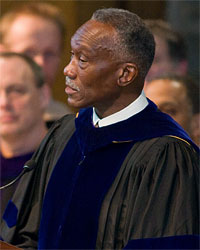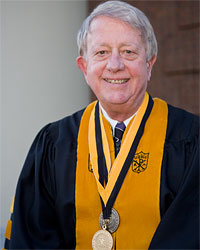University celebrates Founders' Day
Remember the past when planning the future, speaker urges
A veteran faculty member encouraged Wake Forest’s leaders to embrace the best traditions of the past while planning the University’s future, in remarks delivered at Founders’ Day Convocation Thursday.

Herman Eure (PhD ’74)
“The modern version of Wake Forest should be better than the old version, yet still reflect its ancestral lineage,” Professor of Biology Herman Eure (PhD ’74) said in his address. “Our strategic priorities should set forth our aspirations for what we want to become, and also, embrace the best traditions of our past.”
Eure, who joined the faculty in 1974 shortly after he became the first African-American to receive a doctorate degree from Wake Forest, spoke in Wait Chapel during the annual convocation that honors Wake Forest’s founding in February 1834. The format of the program was changed this year; instead of having an outside speaker, the program will now feature speakers, such as faculty members, who are familiar with the University’s history.
Expecting to stay two years when he joined the faculty 34 years ago, Eure never left. “Wake Forest has a way of getting under your skin,” he said. “Its commitment to the liberal arts tradition, its sense of community, its concern for its faculty, staff and students, an emphasis on excellent teaching, its commitment to North Carolina and its citizens, and a powerful commitment to the service of humanity, all combine to make Wake Forest a unique and very special place.”
Eure’s remarks, “Using our Past as a Roadmap for Charting our Future,” came as the University is in the midst of a strategic planning process. He traced the evolution of the University, starting with its founding in 1834 in Wake County; through the move to Winston-Salem in 1956; the admission of women in the 1940s and blacks in the 1960s; its fight for academic and governance freedom in the 1970s and 1980s; and its growth into a national institution in the 1990s.
“Wake Forest can boast of some giants in its history that changed the course of its development,” Eure noted. “Former Presidents Wait, Poteat, Tribble, Scales and Hearn moved their Wake Forest into new directions, directions that made us a better University. However what remained constant in each of their iterations of Wake Forest was our commitment to our core traditional values, our DNA.”
He offered a “prescription for success” for the next stage of the University’s evolution. “The courage of a James Ralph Scales and a Thomas K. Hearn Jr., and their Boards of Trustees should serve as your guide for steering the University into a broader path of self determination; the boldness of a Harold W. Tribble should serve as your model for implementing the right kinds of change; and the vision of a William Louis Poteat should serve as your barometer for determining the appropriate amounts of growth and expansion the University can sustain,” he said. “We must be an institution that remains committed to its core traditional values and constituencies, but also an institution that has the vision, daring and courage to embrace new values and new constituencies.”

Murray Greason (’59, JD ’62)
During the program, President Nathan O. Hatch presented the University’s highest award for service, the Medallion of Merit, to longtime trustee Murray C. Greason (’59, JD ’62). Greason’s ties to the University date back to the Old Campus, where his father was Wake Forest’s basketball coach and his mother worked in the dean’s office. He has been a member of the University’s Board of Trustees since 1991 and served as vice chair from 1997 to 2002 and as chair from 2003 to 2005.
Also during Convocation, several teaching and research awards were presented to faculty members:
- Jenny Puckett (’71), instructor in Romance languages, received the Kulynych Family Omicron Delta Kappa Award for Contribution to Student Life;
- Assistant Professor of Anthropology Paul Thacker received the Reid-Doyle Prize for Excellence in Teaching;
- Associate Professor of Biology Miles Silman received the Award for Excellence in Research;
- Sherry Moss, associate professor of organizational studies in the Babcock Graduate School of Management, received the Cowan Faculty Research Prize;
- Ram Baliga, John B. McKinnon Professor of Management in the Babcock School, received the Kienzle Teaching Award; and
- Associate Professor of Law Robert M. Chesney received the Joseph Branch Excellence in Teaching Award.
New student members of the national honor societies Mortar Board and Omicron Delta Kappa were recognized during the ceremony. Members of the men’s soccer team, which won the NCAA Championship in December, also were recognized, along with members of the field hockey team, which reached the NCAA Final Four, and the football team, which won the Meineke Car Care Bowl in December.
Categories: Happening at Wake, Research & Discovery
Wake Forest News
336.758.5237
media@wfu.edu
Meet the News Team
Headlines
Wake Forest in the News
Wake Forest regularly appears in media outlets around the world.




